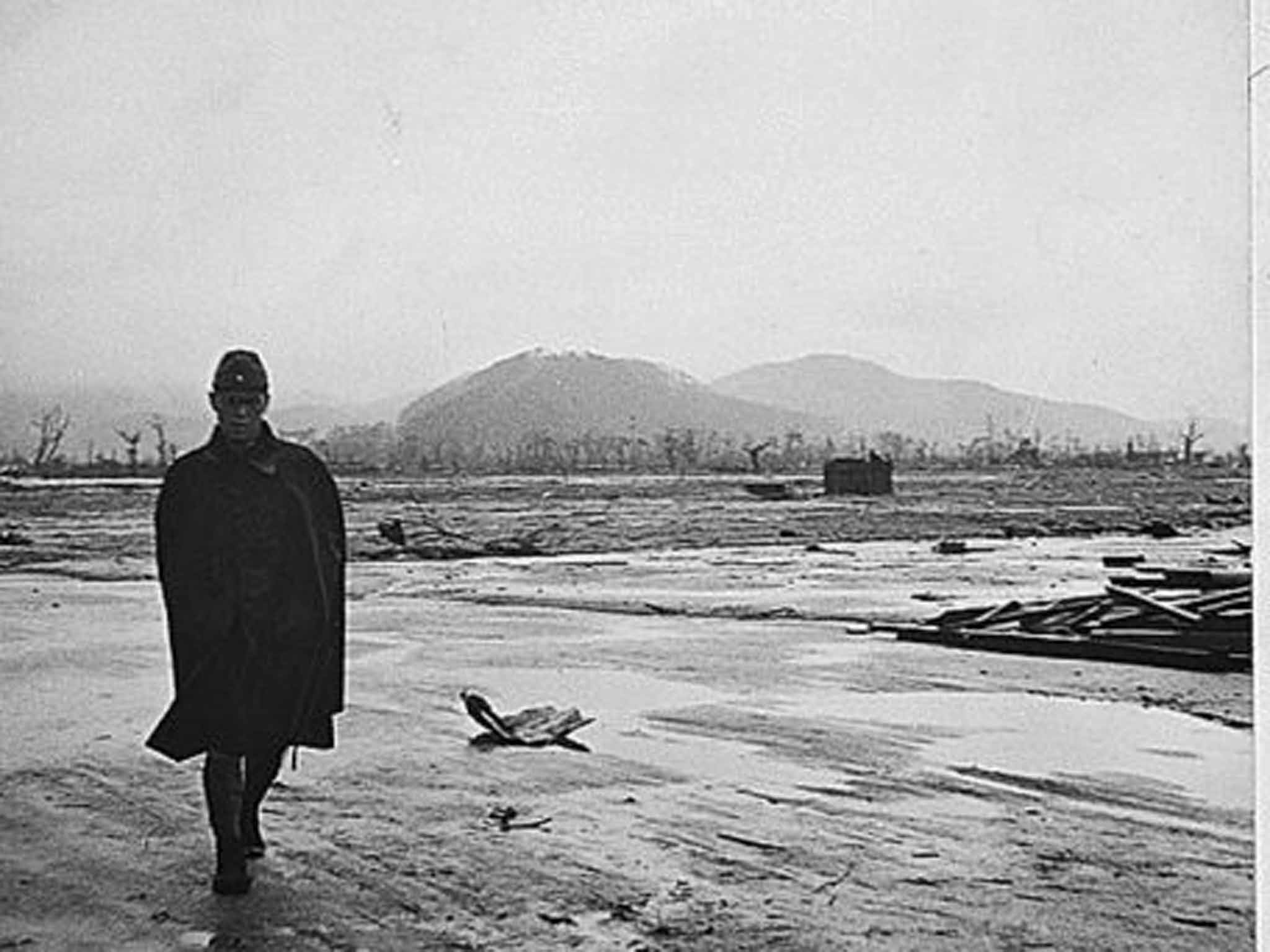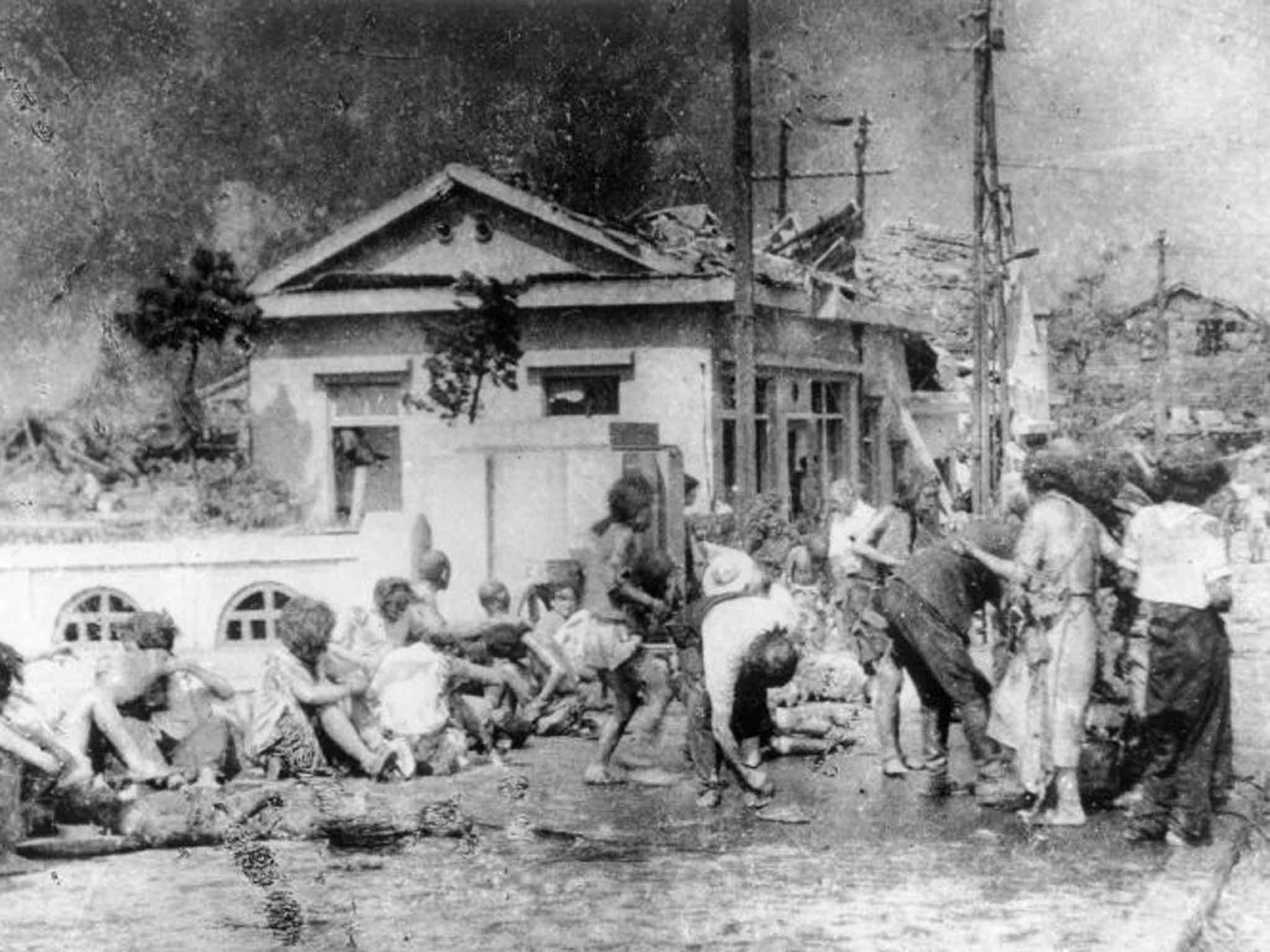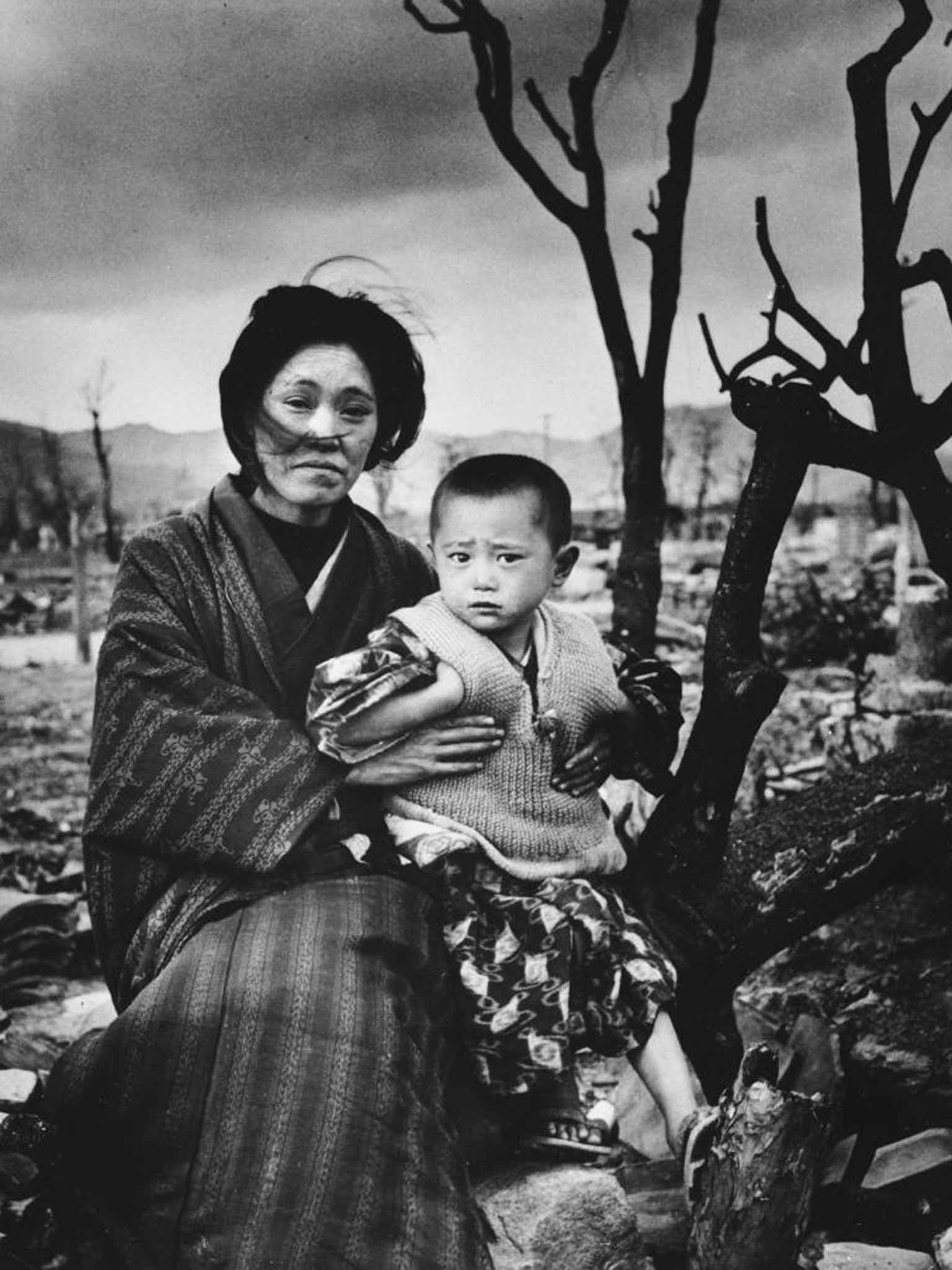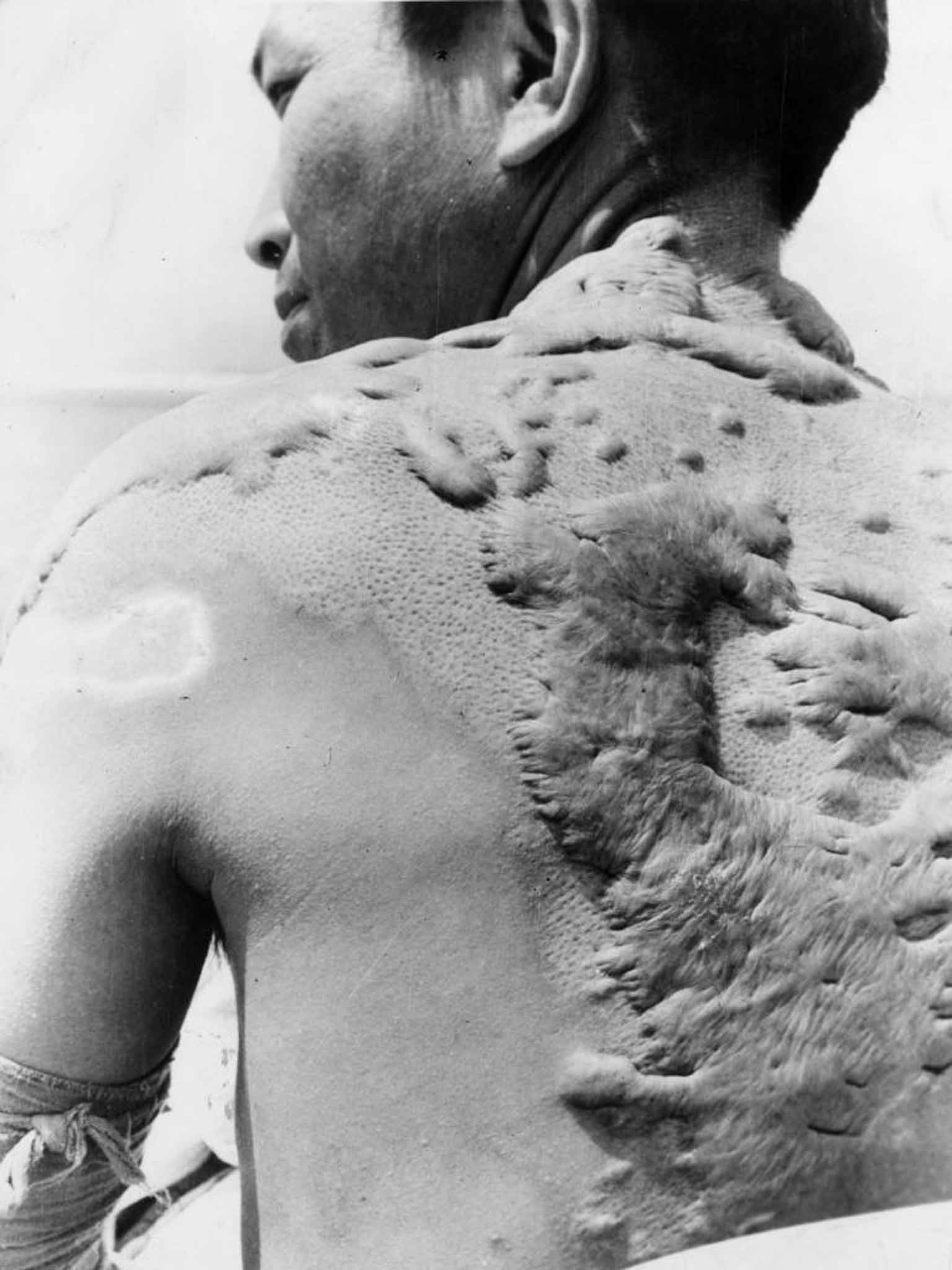The true cost of the Hiroshima bomb: John Hersey's definitive account
Seventy years ago, a nuclear bomb killed 100,000 people and razed two-thirds of their city. Here is an extract from John Hersey's shocking field-report.

At exactly fifteen minutes past eight in the morning, on 6 August 1945, Japanese time, at the moment when the atomic bomb flashed above Hiroshima, Miss Toshiko Sasaki, a clerk in the personnel department of the East Asia Tin Works, had just sat down at her place in the plant office and was turning her head to speak to the girl at the next desk.
At that same moment, Dr Masakazu Fujii was settling down cross-legged to read the Osaka Asahi on the porch of his private hospital, overhanging one of the seven deltaic rivers which divide Hiroshima; Mrs Hatsuyo Nakamura, a tailor's widow, stood by the window of her kitchen, watching a neighbour tearing down his house because it lay in the path of an air-raid-defence fire lane; Father Wilhelm Kleinsorge, a German priest of the Society of Jesus, reclined in his underwear on a cot on the top floor of his order's three-storey mission house, reading a Jesuit magazine; Dr Terufumi Sasaki, a young member of the surgical staff of the city's large, modern Red Cross Hospital, walked along one of the hospital corridors with a blood specimen in his hand; and the Reverend Kiyoshi Tanimoto, pastor of the Hiroshima Methodist Church, paused at the door of a rich man's house in Koi, the city's western suburb, and prepared to unload a handcart full of things he had evacuated from town in fear of the massive B‑29 raid which everyone expected Hiroshima to suffer. Some 100,000 people were killed by the atomic bomb, and these six were among the survivors.
They still wonder why they lived when so many others died. Each of them counts many small items of chance or volition – a step taken in time, a decision to go indoors, catching one street car instead of the next – that spared him. And now each knows that in the act of survival he lived a dozen lives and saw more death than he ever thought he would see. At the time, none of them knew anything.

Reverend Tanimoto got up at five o'clock that morning. Of all the important cities of Japan, only two, Kyoto and Hiroshima, had not been visited in strength by B‑san, or Mr B, as the Japanese, with a mixture of respect and unhappy familiarity, called the B‑29; and Mr Tanimoto, like all his neighbours and friends, was almost sick with anxiety. The frequency of the warnings and the continued abstinence of Mr B with respect to Hiroshima had made its citizens jittery; a rumour was going around that the Americans were saving something special for the city.
Mr Tanimoto had been carrying all the portable things from his church, in the close-packed residential district called Nagaragawa, to a house that belonged to a rayon manufacturer in Koi, two miles from the centre of town. Mr Tanimoto had had no difficulty in moving chairs, hymnals, Bibles, altar gear and church records by pushcart himself, but the organ console and an upright piano required some aid. A friend of his named Matsuo had, the day before, helped him get the piano out to Koi; in return, he had promised this day to assist Mr Matsuo in hauling out a daughter's belongings. The two men set out. The morning was perfectly clear and so warm that the day promised to be uncomfortable. A few minutes after they started, the air-raid siren went off – a minute-long blast that warned of approaching planes but indicated to the people of Hiroshima only a slight degree of danger, since it sounded every morning at this time, when an American weather plane came over.
Mr Tanimoto and Mr Matsuo took their way through the shopping centre, already full of people, across two of the rivers to the sloping streets of Koi, and up them to the outskirts and foothills. As they started up a valley away from the tight-ranked houses, the all-clear sounded. (The Japanese radar operators, detecting only three planes, supposed that they comprised a reconnaissance.) Pushing the handcart up to the rayon man's house was tiring and the men, after they had manoeuvred their load into the driveway and to the front steps, paused to rest awhile. There was no sound of planes. The morning was still; the place was cool and pleasant.
Then a tremendous flash of light cut across the sky. Mr Tanimoto has a distinct recollection that it travelled from east to west, from the city toward the hills. It seemed a sheet of sun. Both he and Mr Matsuo reacted in terror – and both had time to react (they were 3,500 yards, or two miles, from the centre of the explosion). Mr Matsuo dashed up the front steps into the house and dived among the bedrolls and buried himself there. Mr Tanimoto took four or five steps and threw himself between two big rocks in the garden. As his face was against the stone, he did not see what happened. He felt a sudden pressure, and then splinters and pieces of board and fragments of tile fell on him. He heard no roar. (Almost no one in Hiroshima recalls hearing any noise of the bomb.)

When he dared, Mr Tanimoto raised his head and saw that the rayon man's house had collapsed. He thought a bomb had fallen directly on it. Such clouds of dust had risen that there was a sort of twilight around. In panic, not thinking for the moment of Mr Matsuo under the ruins, he dashed out into the street. The first thing he saw was a squad of soldiers who had been burrowing into the hillside opposite, making one of the thousands of dugouts in which the Japanese apparently intended to resist invasion, hill by hill, life for life; the soldiers were coming out of the hole, where they should have been safe, and blood was running from their heads, chests, and backs. They were silent and dazed. Under what seemed to be a local dust cloud, the day grew darker and darker.
Immediately after the explosion, Mr Tanimoto, having run wildly out of the Matsui estate and having looked in wonderment at the bloody soldiers, attached himself sympathetically to an old lady who was walking along in a daze, holding her head with her left hand, supporting a small boy of three or four on her back with her right, and crying: "I'm hurt! I'm hurt! I'm hurt!"
Mr Tanimoto transferred the child to his own back and led the woman by the hand down the street, which was darkened by what seemed to be a local column of dust. He took the woman to a grammar school not far away that had previously been designated for use as a temporary hospital in case of emergency.
By this solicitous behaviour, Mr Tanimoto at once got rid of his terror. At the school, he was much surprised to see glass all over the floor and 50 or 60 injured people already waiting to be treated. He reflected that, although the all-clear had sounded and he had heard no planes, several bombs must have been dropped. He thought of a hillock in the rayon man's garden from which he could get a view of the whole of Koi – of the whole of Hiroshima, for that matter – and he ran back up to the estate.
From the mound, Mr Tanimoto saw an astonishing panorama. Not just a patch of Koi, as he had expected, but as much of Hiroshima as he could see through the clouded air was giving off a thick, dreadful miasma. Clumps of smoke, near and far, had begun to push up through the general dust. He wondered how such extensive damage could have been dealt out of a silent sky; even a few planes, far up, would have been audible. Houses nearby were burning, and when huge drops of water the size of marbles began to fall, he half thought that they must be coming from the hoses of firemen fighting the blazes. (They were actually drops of condensed moisture falling from the turbulent tower of dust, heat and fission fragments that had already risen miles into the sky above Hiroshima.)
Mr Tanimoto turned away from the sight when he heard Mr Matsuo call out to ask whether he was all right. Mr Matsuo had been safely cushioned within the falling house by the bedding stored in the front hall and had worked his way out. Mr Tanimoto scarcely answered. He had thought of his wife and baby, his church, his home, his parishioners, all of them down in that awful murk. Once more he began to run in fear – towards the city. There had been no breeze earlier in the morning when Dr Fujii had walked to the railway station to see his friend off, but now brisk winds were blowing every which way; here on the bridge the wind was easterly. New fires were leaping up and they spread quickly, and in a very short time terrible blasts of hot air and showers of cinders made it impossible to stand on the bridge any more.

Dr Machii ran to the far side of the river and along a still unkindled street. Dr Fujii went down into the water under the bridge, where a score of people had already taken refuge, among them his servants, who had extricated themselves from the wreckage. From there, Dr Fujii saw a nurse hanging in the timbers of his hospital by her legs, and then another painfully pinned across the breast. He enlisted the help of some of the others under the bridge and freed both of them. He thought he heard the voice of his niece for a moment, but he could not find her; he never saw her again. Four of his nurses and the two patients in the hospital died, too.
Dr Fujii went back into the water of the river and waited for the fire to subside. The lot of Dr Fujii, Dr Kanda and Dr Machii right after the explosion – and, as these three were typical, that of the majority of the physicians and surgeons of Hiroshima – with their offices and hospitals destroyed, their equipment scattered, their own bodies incapacitated in varying degrees, explained why so many citizens who were hurt went untended and why so many who might have lived died.
Of 150 doctors in the city, 65 were already dead and most of the rest were wounded. Of 1,780 nurses, 1,654 were dead or too badly hurt to work. In the biggest hospital, that of the Red Cross, only six doctors out of 30 were able to function, and only 10 nurses out of more than 200. The sole uninjured doctor on the Red Cross Hospital staff was Dr Sasaki. After the explosion, he hurried to a storeroom to fetch bandages. This room, like everything he had seen as he ran through the hospital, was chaotic – bottles of medicines thrown off shelves and broken, salves spattered on the walls, instruments strewn everywhere. He grabbed some bandages and an unbroken bottle of Mercurochrome, hurried back to the chief surgeon, and bandaged his cuts. Then he went out into the corridor and began patching up the wounded patients and the doctors and nurses there. He blundered so without his glasses that he took a pair off the face of a wounded nurse, and although they only approximately compensated for the errors of his vision, they were better than nothing. (He was to depend on them for more than a month.)
Dr Sasaki worked without method, taking those who were nearest him first, and he noticed soon that the corridor seemed to be getting more and more crowded. Mixed in with the abrasions and lacerations which most people in the hospital had suffered, he began to find dreadful burns. He realised then that casualties were pouring in from outdoors. There were so many that he began to pass up the lightly wounded; he decided that all he could hope to do was to stop people from bleeding to death. Before long, patients lay and crouched on the floors of the wards and the laboratories and all the other rooms, and in the corridors, and on the stairs, and in the front hall, and under the porte-cochère, and on the stone front steps, and in the driveway and courtyard, and for blocks each way in the streets outside.
Wounded people supported maimed people; disfigured families leaned together. Many people were vomiting. A tremendous number of schoolgirls – some of those who had been taken from their classrooms to work outdoors, clearing fire lanes – crept into the hospital. In a city of 245,000, nearly 100,000 people had been killed or doomed at one blow; 100,000 more were hurt. At least 10,000 of the wounded made their way to the best hospital in town, which was altogether unequal to such a trampling, since it had only 600 beds, and they had all been occupied.
The people in the suffocating crowd inside the hospital wept and cried, for Dr Sasaki to hear, "Sensei! Doctor!", and the less seriously wounded came and pulled at his sleeve and begged him to go to the aid of the worse wounded. Tugged here and there in his stockinged feet, bewildered by the numbers, staggered by so much raw flesh, Dr Sasaki lost all sense of profession and stopped working as a skilful surgeon and a sympathetic man; he became an automaton, mechanically wiping, daubing, winding, wiping, daubing, winding.
Some of the wounded in Hiroshima were unable to enjoy the questionable luxury of hospitalisation. In what had been the personnel office of the East Asia Tin Works, Miss Sasaki lay doubled over, unconscious, under the tremendous pile of books and plaster and wood and corrugated iron. She was wholly unconscious (she later estimated) for about three hours. Her first sensation was of dreadful pain in her left leg. It was so black under the books and debris that the borderline between awareness and unconsciousness was fine; she apparently crossed it several times, for the pain seemed to come and go. At the moments when it was sharpest, she felt that her leg had been cut off somewhere below the knee. Later, she heard someone walking on top of the wreckage above her, and anguished voices spoke up, evidently from within the mess around her: "Please help! Get us out!"
Father Kleinsorge stemmed Father Schiffer's spurting cut as well as he could with some bandage that Dr Fujii had given the priests a few days before. When he finished, he ran into the mission house again and found the jacket of his military uniform and an old pair of grey trousers. He put them on and went outside. A woman from next door ran up to him and shouted that her husband was buried under her house and the house was on fire; Father Kleinsorge must come and save him.
Father Kleinsorge, already growing apathetic and dazed in the presence of the cumulative distress, said: "We haven't much time." Houses all around were burning, and the wind was now blowing hard. "Do you know exactly which part of the house he is under?" he asked. "Yes, yes," she said. "Come quickly."
They went around to the house, the remains of which blazed violently, but when they got there, it turned out that the woman had no idea where her husband was. Father Kleinsorge shouted several times: "Is anyone there?"
There was no answer. Father Kleinsorge said to the woman: "We must get away or we will all die." He went back to the Catholic compound and told the Father Superior that the fire was coming closer on the wind, which had swung around and was now from the north; it was time for everybody to go.
Just then, the kindergarten teacher pointed out to the priests Mr Fukai, the secretary of the diocese, who was standing in his window on the second floor of the mission house, facing in the direction of the explosion, weeping.
Father Cieslik, because he thought the stairs unusable, ran around to the back of the mission house to look for a ladder. There he heard people crying for help under a nearby fallen roof. He called to passers‑by running away in the street to help him lift it, but nobody paid any attention, and he had to leave the buried ones to die. Father Kleinsorge ran inside the mission house and scrambled up the stairs, which were awry and piled with plaster and lathing, and called to Mr Fukai from the doorway of his room.
Mr Fukai, a very short man of about 50, turned around slowly, with a queer look, and said: "Leave me here." Father Kleinsorge went into the room and took Mr Fukai by the collar of his coat and said: "Come with me or you'll die." Mr. Fukai said: "Leave me here to die." Father Kleinsorge began to shove and haul Mr Fukai out of the room. Then the theological student came up and grabbed Mr Fukai's feet, and Father Kleinsorge took his shoulders, and together they carried him downstairs and outdoors. "I can't walk!" Mr. Fukai cried. "Leave me here!"
Father Kleinsorge got his paper suitcase with the money in it and took Mr Fukai up piggyback and the party started for the East Parade Ground, their district's "safe area". As they went out of the gate, Mr Fukai, quite childlike now, beat on Father Kleinsorge's shoulders and said: "I won't leave. I won't leave." Irrelevantly, Father Kleinsorge turned to Father LaSalle and said: "We have lost all our possessions but not our sense of humour."
The street was cluttered with parts of houses that had slid into it, and with fallen telephone poles and wires. From every second or third house came the voices of people buried and abandoned, who invariably screamed, with formal politeness: "Tasukete kure! Help, if you please!" The priests recognised several ruins from which these cries came as the homes of friends but because of the fire it was too late to help. All the way, Mr Fukai whimpered: "Let me stay." The party turned right when they came to a block of fallen houses that was one flame. At Sakai Bridge, which would take them across to the East Parade Ground, they saw that the whole community on the opposite side of the river was a sheet of fire; they dared not cross and decided to take refuge in Asano Park, off to their left.
Father Kleinsorge, who had been weakened for a couple of days by a bad case of diarrhoea, began to stagger under his protesting burden and, as he tried to climb up over the wreckage of several houses that blocked their way to the park, he stumbled, dropped Mr Fukai and plunged down, head over heels, to the edge of the river. When he picked himself up, he saw Mr Fukai running away. Father Kleinsorge shouted to a dozen soldiers, who were standing by the bridge, to stop him. As Father Kleinsorge started back to get Mr Fukai, Father LaSalle called out: "Hurry! Don't waste time!" So Father Kleinsorge just requested the soldiers to take care of Mr Fukai. They said they would, but the little, broken man got away from them, and the last the priests could see of him, he was running back toward the fire.
Mr Tanimoto, fearful for his family and church, at first ran toward them by the shortest route, along Koi Highway. He was the only person making his way into the city; he met hundreds and hundreds who were fleeing, and every one of them seemed to be hurt in some way. The eyebrows of some were burned off and skin hung from their faces and hands. Others, because of pain, held their arms up as if carrying something in both hands. Some were vomiting as they walked. Many were naked or in shreds of clothing.
On some undressed bodies, the burns had made patterns – of undershirt straps and suspenders and, on the skin of some women (since white repelled the heat from the bomb and dark clothes absorbed it and conducted it to the skin), the shapes of flowers they had had on their kimonos. Many, although injured themselves, supported relatives who were worse off. Almost all had their heads bowed, looked straight ahead, were silent and showed no expression whatever.
After crossing Koi Bridge and Kannon Bridge, having run the whole way, Mr Tanimoto saw, as he approached the centre, that all the houses had been crushed and many were on fire. Here the trees were bare and their trunks were charred. He tried at several points to penetrate the ruins, but the flames always stopped him. Under many houses, people screamed for help, but no one helped; in general, survivors that day assisted only their relatives or immediate neighbours, for they could not comprehend or tolerate a wider circle of misery. The wounded limped past the screams, and Mr Tanimoto ran past them.
As a Christian he was filled with compassion for those who were trapped, and as a Japanese man he was overwhelmed by the shame of being unhurt, and he prayed as he ran: "God help them and take them out of the fire."
'Hiroshima' by John Hersey (Penguin, £1.99) is out in an anniversary edition on Thursday
Join our commenting forum
Join thought-provoking conversations, follow other Independent readers and see their replies
Comments
Bookmark popover
Removed from bookmarks